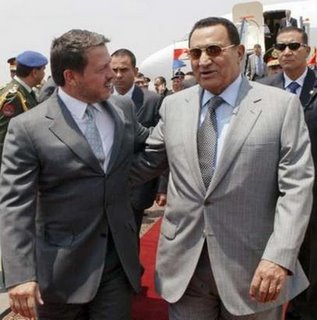
 While Arab kings and presidents grinned from ear to ear and conferred on the “crisis” under the watchful eyes of their security details, displacement, death, and destruction blanketed Gaza and Lebanon. The massive Israeli offensive by air, sea, and land spares no one and shows no signs of abatement.
While Arab kings and presidents grinned from ear to ear and conferred on the “crisis” under the watchful eyes of their security details, displacement, death, and destruction blanketed Gaza and Lebanon. The massive Israeli offensive by air, sea, and land spares no one and shows no signs of abatement.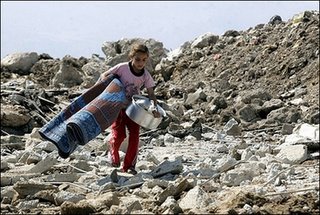
 A Lebanese girl crosses a destroyed bridge in the village of Ferzoul, near Zahle city in the Bekaa valley of Lebanon, and a Palestinian boy is severely wounded during an Israeli army attack on the Mughazi refugee camp in Gaza (20 July).
A Lebanese girl crosses a destroyed bridge in the village of Ferzoul, near Zahle city in the Bekaa valley of Lebanon, and a Palestinian boy is severely wounded during an Israeli army attack on the Mughazi refugee camp in Gaza (20 July).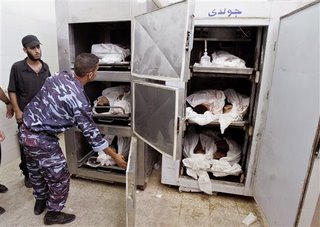
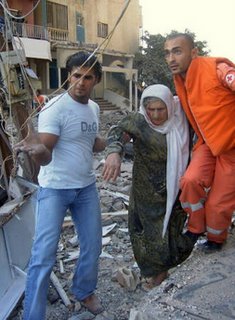 Palestinian policemen inspect bodies of Palestinians killed in the Israeli offensive against the Mughazi refugee camp before they are released to their families (20 July). Medics help a woman who was injured in an Israeli aircraft attack that destroyed a house in Tyre, Lebanon (16 July).
Palestinian policemen inspect bodies of Palestinians killed in the Israeli offensive against the Mughazi refugee camp before they are released to their families (20 July). Medics help a woman who was injured in an Israeli aircraft attack that destroyed a house in Tyre, Lebanon (16 July). In Nablus, Israeli bulldozers destroyed a building used by the Palestinian Interior Ministry (20 July).
In Nablus, Israeli bulldozers destroyed a building used by the Palestinian Interior Ministry (20 July).To date, well over 100 Gazans and 300 Lebanese have been killed; Israelis killed number 28.
While world "leaders" hemmed and hawed and repeated that "Israel has the right to defend itself," ordinary people have taken action. In the past week, Arabs and non-Arabs all over the world have expressed their outrage at Israeli aggression and solidarity with the Lebanese and Palestinian peoples. Protests of varying sizes erupted in Brazil, Greece, Mexico, Turkey, Pakistan, Jordan, Egypt, Yemen, Venezuela, Britain, Bangladesh, Malaysia, Chile, El Salvador, the United States, Ukraine, Kuwait, Spain, Iraq, Indonesia, Syria, the Philippines, and Argentina.
Meanwhile, yesterday American Secretary of State Condoleezza Rice dined with UN Secretary-General Kofi Annan at the Waldorf Astoria Hotel in New York and "discussed the situation in the Middle East." The United States and Israel oppose the UN's call for an immediate ceasefire. Perhaps they feel that not enough Arab civilians have been killed to warrant a ceasefire. Israel's ambassador to the UN said, "When you operate on a cancerous growth you do not stop in the middle, sew the patient up and tell him keep living with that growth until it kills you...You make sure it is totally removed."
Today’s al-Ahram indicates that in their summit, Mubarak and the Bahraini potentate "emphasised the importance of stability in the Middle East, and preventing the escalation of the situation in a manner difficult to control, and prioritising the language of dialogue instead of the language of force."
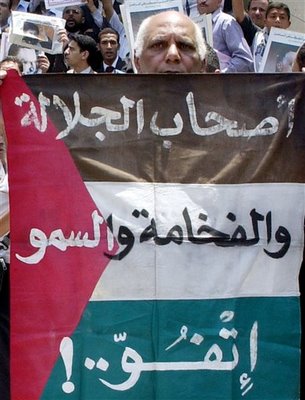 On 16 July, in a protest in Cairo, al-Karama movement's Muhammad al-Ashqar held up a sign that made its first appearance in March 2003, during the American invasion of Iraq: “Your majesties and excellencies: spit on you!”
On 16 July, in a protest in Cairo, al-Karama movement's Muhammad al-Ashqar held up a sign that made its first appearance in March 2003, during the American invasion of Iraq: “Your majesties and excellencies: spit on you!”*Photos from AP, Reuters, AFP.
